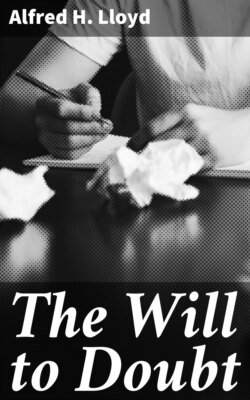Читать книгу The Will to Doubt - Alfred H. Lloyd - Страница 6
На сайте Литреса книга снята с продажи.
INTRODUCTION.
ОглавлениеTable of Contents
Without undue sensationalism it may be said that this is an age of doubt. Wherever one looks in journeying through the different departments of life one sees doubt. And one sees, too, some of the blight which doubt produces, although the blight is by no means all that one sees. There is heat everywhere in the physical world, but not necessarily only arson or even destructive fire. Morals, however, social life, industry, politics, religion, have suffered somewhat—and many would insist very seriously—from the prevailing doubt. Moreover, if the outward view shows doubt everywhere, the inward view is at least not more reassuring. Who can examine his own consciousness without finding doubt at work there? We would often hide it from others, not to say from ourselves, but it is there, and we all know it to be there. Other times may also have been times of doubt, but our day, as the time to which we certainly owe our first and chief duty, is very conspicuously and very seriously a time of doubt.
Now there are some, and they are many, who would decry the discussion of such a thing as doubt, for they see only danger ahead. Doubt they compare with death or disease, and to dwell upon any of these is idle, unnatural, morbid. Why not let such things alone, and look only to what is pleasant, to what is good and true and beautiful? Then, too, doubt, the confession of doubt, is the royal entrance to philosophy and the risk of an entanglement with philosophy, which seems to them the source of much that is harmful, the essence of all that is impractical, is altogether too great. Doubt for them is even less to be played with than fire, with which already it has been compared here. Again, as others in matters political and industrial, so they in matters intellectual and spiritual resent anything that appears likely in any way to disturb the standing credit of the country. To doubt is just to join the opposition, and the opposition is made up of heretics and agents generally of mere destruction. To treat doubt as real and positively significant, as having any true worth in human experience, as being even a proper object of will, is to stop permanently, not the wheels of commerce and industry, but the wheels of the present life in all its phases. In a word, perhaps one of the words of the hour, Christian Science has not wished to be more inhospitable to the reality of disease than have these believers to the reality and usefulness of doubt.
Yet all who feel in this way are short-sighted. Their contentions, like those of their cousins, perhaps their country cousins, the Christian Scientists, may have worth for being corrective, but at very best they are only one-sided. In a fable, never in real life, a man might get the smell of burning wood in his house and refuse to recognize the danger because of the inevitable delay to his business which the alarm of fire would involve; but doubt is not less real nor less dangerous, nor even less capable, when under control, of useful applications. Any danger, too, squarely faced is at least half met. Why, then, be so impracticable, so like characters in fables, as to overlook or turn one's back upon the doubt of the day, refusing it a place and a part in real life? The negative things of life can be so only relatively. Death itself cannot possibly be absolute, and doubt, not unlike death, indeed perhaps only one of death's messengers, must be even a gift, or an agent, of the gods. Some things, dangerous when hidden, are wonderfully serviceable, when recognized and controlled. Sometimes men really have entertained angels unawares.
And so throughout these chapters, although some may think me and those who follow me morbid, and although we may have to enter the dangerous parlour of philosophy, the doubt of our time is to be squarely and fairly faced. In all candour, we are from the start to be confessed parties to it, hiding nothing intentionally, and at the same time trying always to give nothing undue emphasis. The doubt that all seem to know, that many really feel without perhaps clearly confessing, and that some confess or even actually boast, we shall face and examine closely, trying as we can to find its true meaning and real worth. In short, the confession of doubt, of our doubt, and the fruits of confession are the burden of these chapters.
